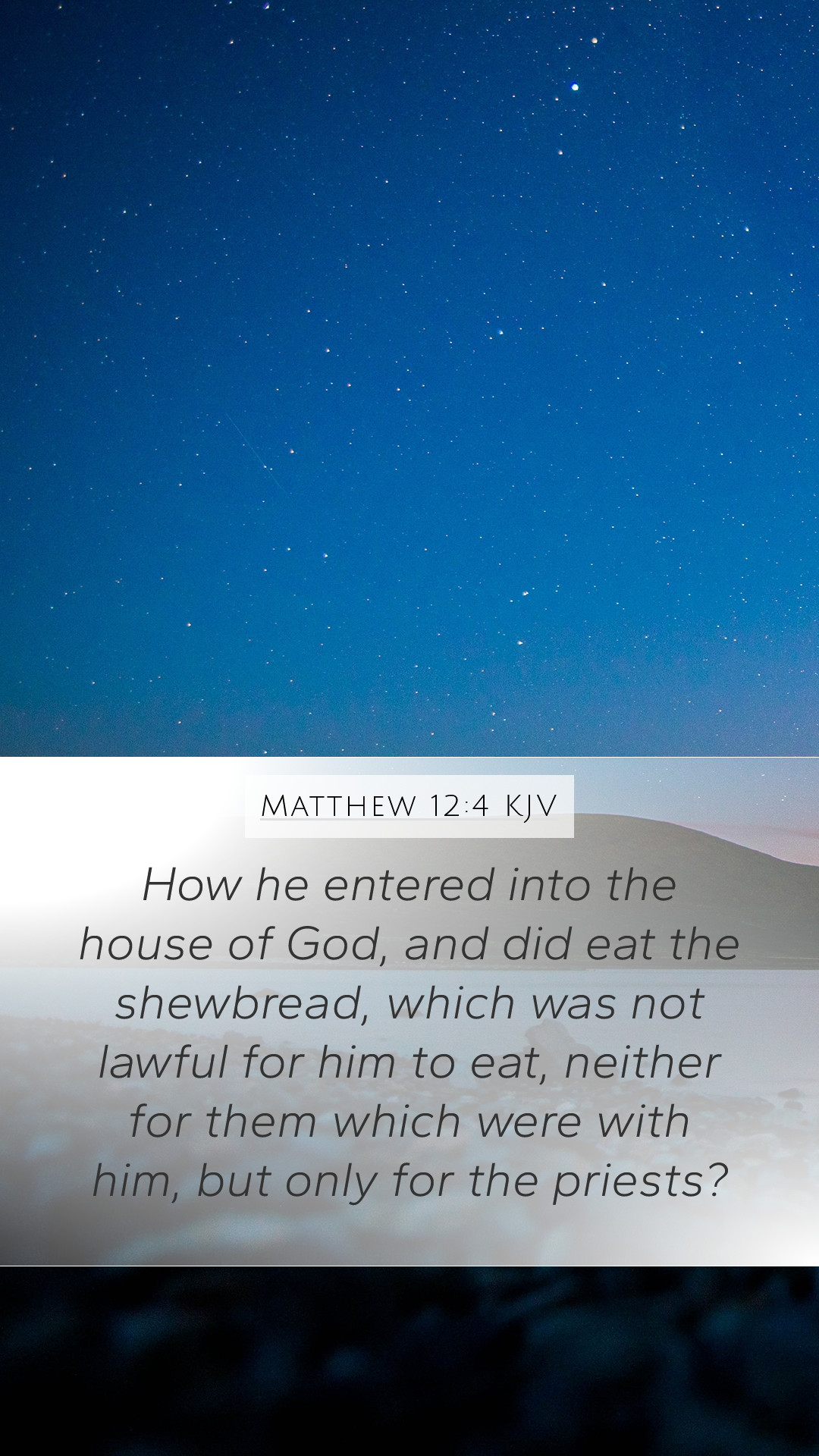Understanding Matthew 12:4
This passage from the Gospel of Matthew reveals important truths about Jesus' ministry and the interpretation of the Law. In Matthew 12:4, we find Jesus referencing an event from the life of David to illustrate His point about the nature of obedience to God's commandments.
Text of Matthew 12:4
Matthew 12:4 (KJV): "How he entered into the house of God, and did eat the shewbread, which was not lawful for him to eat, neither for them which were with him, but only for the priests."
Verse Summary and Commentary
In this verse, Jesus highlights an instance when King David, under dire circumstances, took and ate the shewbread, which was reserved exclusively for the priests. This act was technically against the Law, yet it was justified by the needs of David and his companions.
Key Insights:
- Historical Context: David and his men were fleeing from Saul, and they were in need of food. Their hunger prompted them to seek provision in the house of God, where they found the consecrated shewbread.
- Principle of Mercy: Jesus uses this example to illustrate that the spirit of the law, which emphasizes mercy and human need, can sometimes take precedence over the letter of the law.
- Authority of Christ: By referencing David's actions, Jesus asserts His authority to interpret the Law, suggesting that He has the power to override traditional interpretations that ignore human necessity.
- Precedent for Discipleship: The passage also serves as a precedent for Christ's followers, emphasizing that our spiritual needs should be placed above rigid adherence to ceremonial rules.
Commentary Insights
Matthew Henry's Commentary: Matthew Henry elaborates on the point that Jesus' mention of David shows God's grace and compassion during David's time, and insists that this attitude should carry forward into Christian practice.
Albert Barnes' Notes: Albert Barnes notes that the shewbread represents sustenance derived from God's provision, and that mercy and compassion are at the heart of God’s Law.
Adam Clarke's Commentary: Adam Clarke emphasizes that rules should never be elevated above human well-being, pointing out the lack of understanding amongst the Pharisees who chastised the disciples for picking grain on the Sabbath.
Application of Matthew 12:4
This verse challenges us to reflect on our understanding of Scripture and the laws we uphold. It prompts consideration of how we apply Biblical principles in our daily lives and illustrates that the core of God's commandments lies in love, mercy, and meeting the needs of others.
Practical Takeaways:
- Prioritize People Over Rituals: Emphasize human compassion and needs above mere observance of rules.
- Reflect on the Purpose of God's Laws: Laws are intended to guide us towards a loving relationship with God and one another.
- Engage in Bible Study: Use this verse as a starting point for deeper discussions in Bible study groups or to enrich your personal studies.
Cross References
- 1 Samuel 21:6: The account of David eating the shewbread.
- Mark 2:25-26: Another recounting of Jesus’ reference to David.
- Exodus 25:30: Instructions regarding the shewbread in the tabernacle.
- Hosea 6:6: "For I desire mercy, not sacrifice."
Conclusion
This examination of Matthew 12:4 reveals profound truths about the nature of God's Law and Jesus' ministry. It challenges believers to embrace mercy and compassion over strict legalism. Understanding the meaning of this Bible verse encourages deeper exploration of Scripture and application of its timeless principles in our lives.
In examining this verse, we gain valuable Bible study insights that can inform our approach to faith and obedience, emphasizing that our relationship with God is not merely about following rules but also about embodying His love and mercy in our interactions with others.


